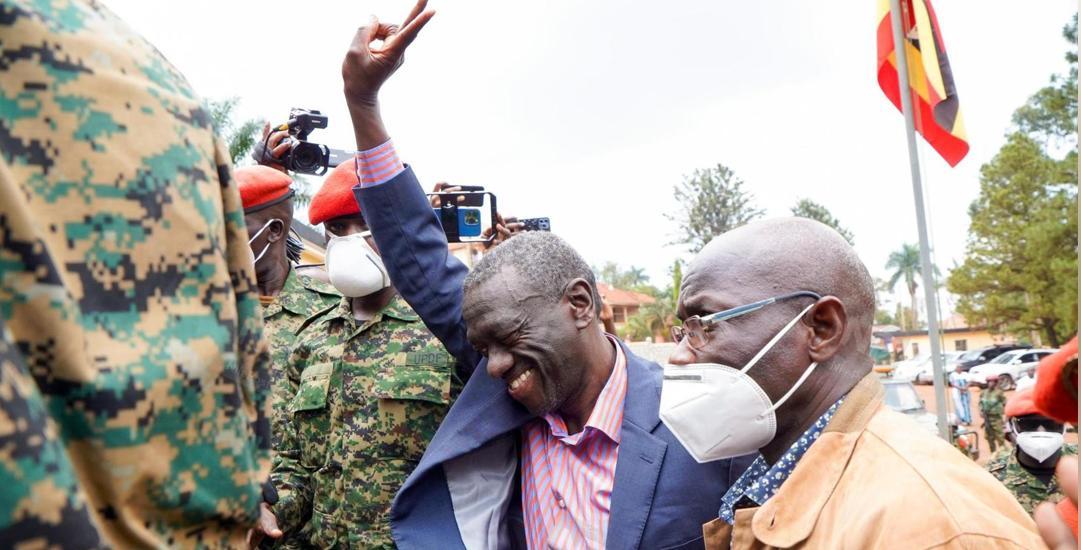Africa-Press – Uganda. Even from Luzira Prison, Dr Kizza Besigye remains a commanding force in opposition politics—his symbolic leadership galvanising a new generation of change-seekers ahead of the 2026 elections.
For Dr Besigye, a four-time presidential candidate and enduring thorn in the side of President Museveni’s government, incarceration has never meant silence.
Held on treason charges in Luzira Maximum Security Prison—a charge he has faced more than once—Besigye’s political resolve continues to echo far beyond the prison walls, reinvigorating the opposition and solidifying his status as a symbol of unyielding defiance.
Now seven months into his current detention, Besigye’s influence is arguably stronger than ever. His supporters continue to rally, composing new chants and songs that double as protest anthems and morale boosters.
The latest, titled “Besigye Mulwanyi” (Besigye is a Fighter), has become a national rallying cry, evoking a spirit of resilience akin to “We Shall Overcome.”
Luzira Prison has become an unlikely nerve centre for Uganda’s opposition politics. Senior figures—including National Unity Platform (NUP) leader Robert Kyagulanyi, better known as Bobi Wine—regularly visit Besigye for strategy consultations.
Despite his confinement, Besigye is the registered “party member number 001” in the newly launched People’s Front for Freedom (PFF), officially certified on June 5, 2025.
Kampala Lord Mayor and PFF interim president Erias Lukwago confirmed that consultations with Besigye continue unabated.
“He works in the interest of the people. The consistency, the authenticity—these are rare qualities,” Lukwago told this reporter.
“The government’s oppression hasn’t silenced him; if anything, it’s kept his leadership candle burning.”
According to Lukwago, Besigye’s enduring appeal lies in his unwavering commitment to fighting injustice—traits that have positioned him as a towering figure in Uganda’s pro-democracy movement.
“His legacy now inspires a new generation—those who didn’t witness the Bush War, but have seen a different kind of resilience.”
Leading from prison is not a new chapter in Besigye’s long political journey. In 2001, he was famously nominated for the presidency while incarcerated on a rape charge that was later dismissed.
Such moments have made his brand of opposition politics both unique and symbolic—challenging conventional ideas of leadership within a democratic framework.
Legal experts say there is no constitutional barrier to Besigye’s candidacy, even in his current status.
Wandera Ogalo, a lawyer and former member of the Constituent Assembly that drafted the 1995 Constitution, emphasized that being on remand does not strip one of their right to contest for public office.
“The law is clear—someone on remand is not guilty. If Besigye were to be elected president, he would be immune from criminal prosecution and would assume office within 24 hours of the previous term’s expiry.”
Ogalo added that the state’s prolonged crackdown on Besigye has inadvertently entrenched his political capital.
“The continuous oppression against him has made many supporters see him as their true representation. In fact, state institutions have played a role in cementing Besigye’s grip on the opposition base.”
Discussions around Besigye’s potential return to the presidential ballot remain ongoing within the PFF. Lukwago described it as “a matter under discussion,” while fellow party leader Salaam Musumba did not rule out the possibility.
“The choice lies not with Besigye alone but with the mission of change seekers,” she said, indicating that the party remains open to multiple scenarios, including Besigye’s return or a new face altogether.
Whether from a prison cell or the campaign trail, Besigye’s imprint on Uganda’s political future remains undeniable.
His latest stint in Luzira has only served to further elevate his status from politician to political institution—his name now synonymous with a decades-long quest for democratic reform.
As Uganda edges closer to the 2026 general elections, the question is no longer whether Dr. Kizza Besigye can lead from behind bars—but whether anyone else can command the same influence from outside them.
For More News And Analysis About Uganda Follow Africa-Press






